BGI Genomics 2023 Global State of Thalassemia Awareness Report
2023-11-11
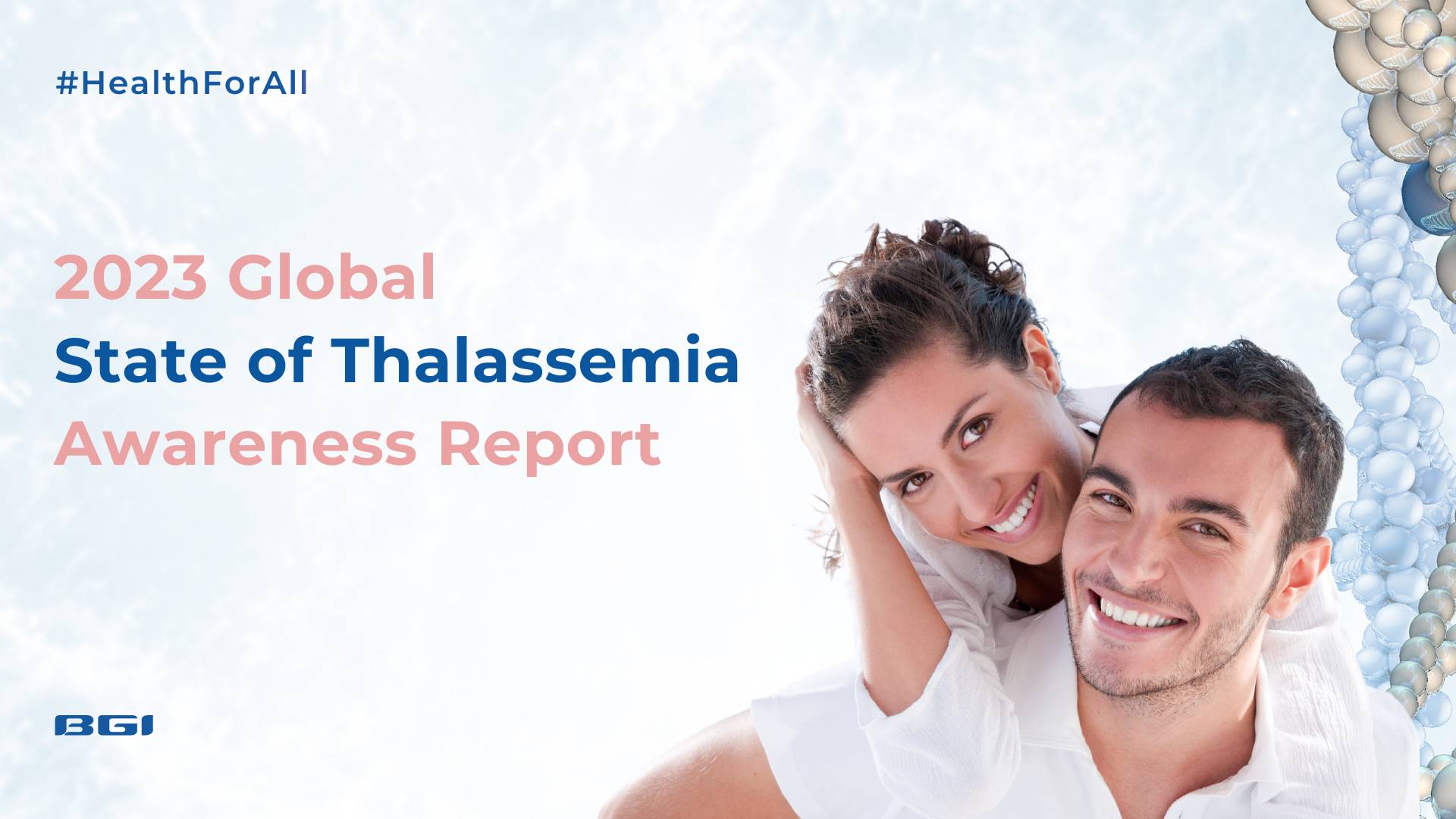
5.2% of the global population carry hemoglobin abnormalities, resulting in 300,000 to 400,000 children born with severe hemoglobinopathies annually. Thalassemia, a hereditary hemoglobinopathy, occurs in 4.4 out of every 10,000 live births, and is prevalent in Mediterranean coastal areas, Africa, the Middle East, Southeast Asia, and southern China.
Thalassemia is often classified as α-thalassemia or β-thalassemia depending on whether the anomaly results from the synthesis of alpha (α) chains or beta (β) chains making up the protein. Treatments for moderate to severe thalassemia include frequent blood transfusions, chelation therapy to remove excess iron from the blood, and hematopoietic stem cell transplantation (HSCT), which are costly and impose challenges on patients, their families, and the healthcare system.
Screening and antenatal diagnosis reduced the frequency of β-thalassemia in many Mediterranean countries. Focusing on other regions with high thalassemia prevalence, BGI Genomics has launched a global thalassemia awareness survey to assess the level of knowledge and attitudes related to the associated health risks, thalassemia carrier screening, and genetic counseling for carriers. By examining these key areas, this survey seeks to highlight the associated barriers and opportunities.
This survey covers 1,847 women from Azerbaijan, China, Indonesia, Kuwait, Saudi Arabia, and Thailand. The findings highlighted the urgent need to improve awareness, address barriers, and enhance access to screening:
Most don’t know much about thalassemia: 70.5% of women did not know much about thalassemia symptoms and the associated health risks, with another 14.4% indicating they never heard about thalassemia. The proportion of women who knew little about thalassemia does not vary significantly with age or marital status.
Greater willingness to undergo thalassemia screening with more information: After learning about the health risks and high lifetime treatment costs associated with thalassemia, 84.5% of women are more willing to undergo some form of thalassemia screening (premarital, pre-pregnancy, and prenatal tests). Greater thalassemia awareness will likely result in more positive attitude changes towards screening tests, leading to better health outcomes.
Accessibility matters: Hospitals or agencies nearby that provide screening services (43.1%), cost of screening services (38.1%), and before getting married or having children (35.3%) are the top reasons that affect the willingness to undergo thalassemia screening.
Thalassemia carriers are more open to genetic counseling: If both partners are thalassemia carriers, 50.8% of women can persuade their partners to seek genetic counseling and consider preimplantation genetic diagnosis (PGD), raising the likelihood of giving birth to a child free from thalassemia. If women have obtained information about thalassemia from health awareness programs, this percentage rises to 59.5%. Thus, health awareness programs may play a key role in genetic counseling and PGD promotion.
Dr. Zhiyu Peng, BGI Genomics Deputy GM, notes: "This survey shows that enhancing awareness and accessibility are an important first step in thalassemia control programs. Region‐specific screening and treatment programs, customized to align with local healthcare resources and cultural values, are also vital to identify thalassemia patients and carriers. Such customization will facilitate the provision of information and care to obtain better health outcomes while reducing costs for their families and the healthcare system."
Dr. Androulla Eleftheriou, Thalassaemia International Federation Executive Director, comments: "Enhancing awareness is a crucial first step in promoting individual behavior changes and policy reforms, ultimately leading to improved prevention, control, and management of thalassemia. Screening services – a key component of any effective national control programme – needs to consider cultural and socio-economic backgrounds. We welcome BGI Genomics efforts and reaffirm our commitment to further expanding thalassemia awareness on a global scale."
Thalassemia Awareness
Approximately 80% of thalassemia occurs in low- or middle-income countries where an unequal distribution of medical resources is more likely to pose a risk to patients' quality of life. Public awareness, screening, genetic counseling, and prenatal diagnosis are essential to thalassemia control programs. Therefore, this survey seeks to understand women's awareness of thalassemia symptoms, the associated health risks, and screening tests.
How’s the level of thalassemia awareness worldwide?
Despite this survey taking place in high-prevalence thalassemia regions, 70.5% worldwide did not know much about thalassemia symptoms and the associated health risks, with another 14.4% indicating they never heard about thalassemia. Kuwait (77.4%) and Azerbaijan (75.2%) are the most likely to know little about thalassemia. The proportion of women who know little about thalassemia does not vary significantly with age or marital status.
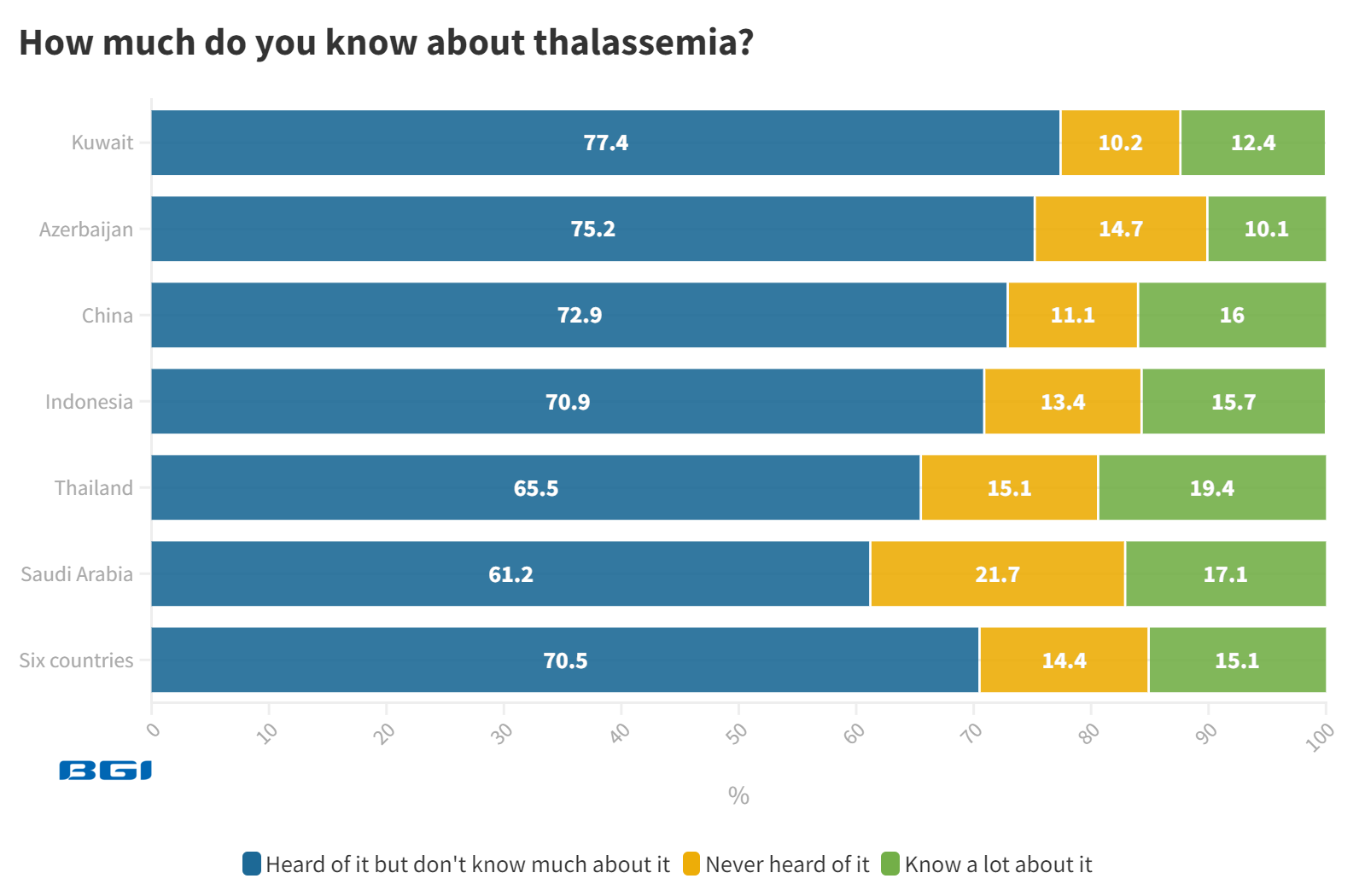
51.7% and 36.5% worldwide are aware of blood transfusion treatment and chelation therapy to remove excess iron from the blood, respectively, for thalassemia patients. Kuwait (66.7%) and Indonesia (54.1%) have the highest percentage who are aware of blood transfusion treatment. Among women who are thalassemia patients, carriers, or have a family history of thalassemia, 57.9% are aware of chelation therapy, which is higher than the global average.
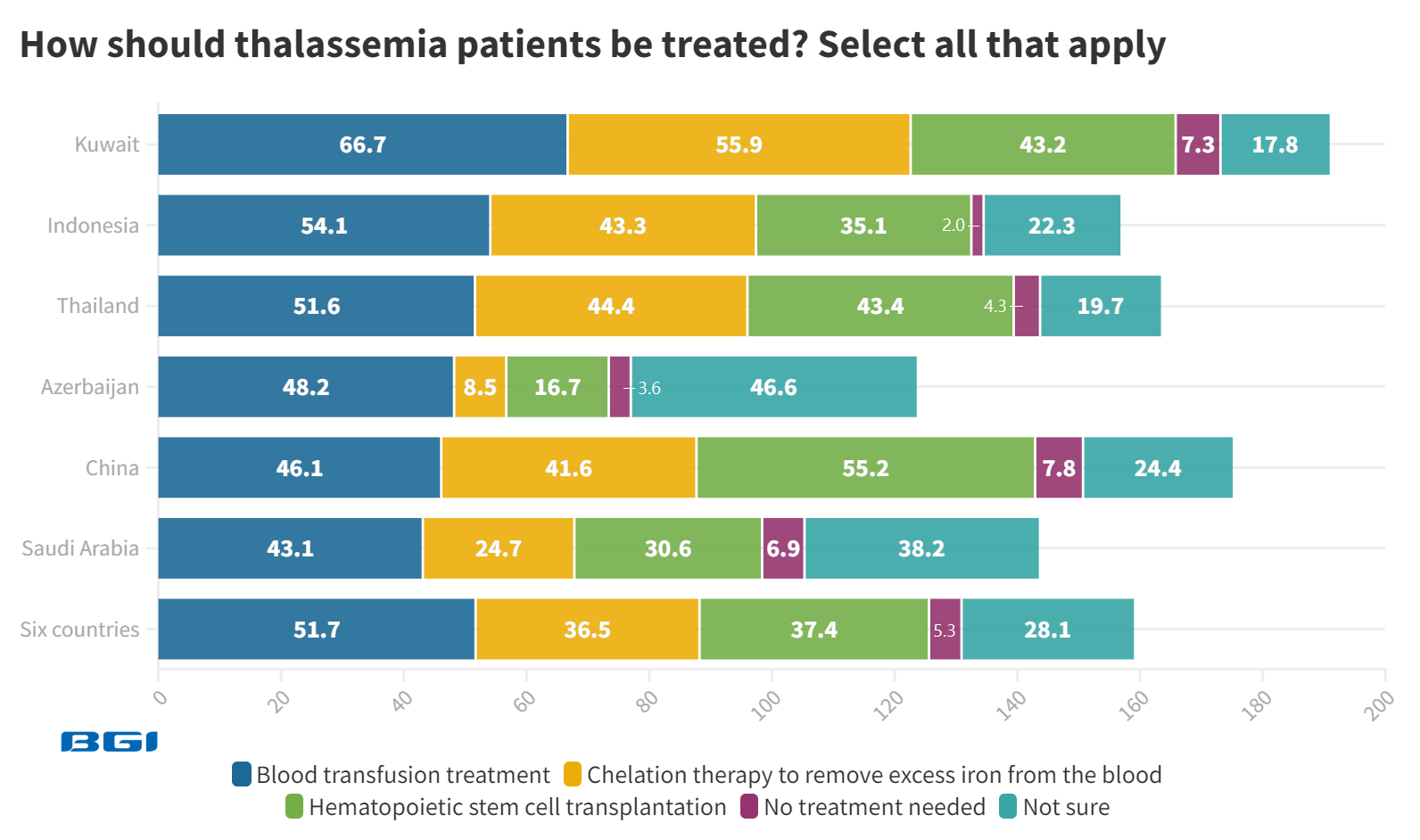
What do women know about thalassemia carrier screening?
38.0% worldwide indicate they are unaware or unsure about thalassemia carrier screening. Azerbaijan (60.2%) and Saudi Arabia (53.5%) have the highest percentage in this category. Kuwait has the highest awareness of thalassemia carrier screening, with only 17.2% saying they are unaware or unsure about thalassemia carrier screening while indicating routine blood tests, hemoglobin electrophoresis, and genetic testing are the available options.
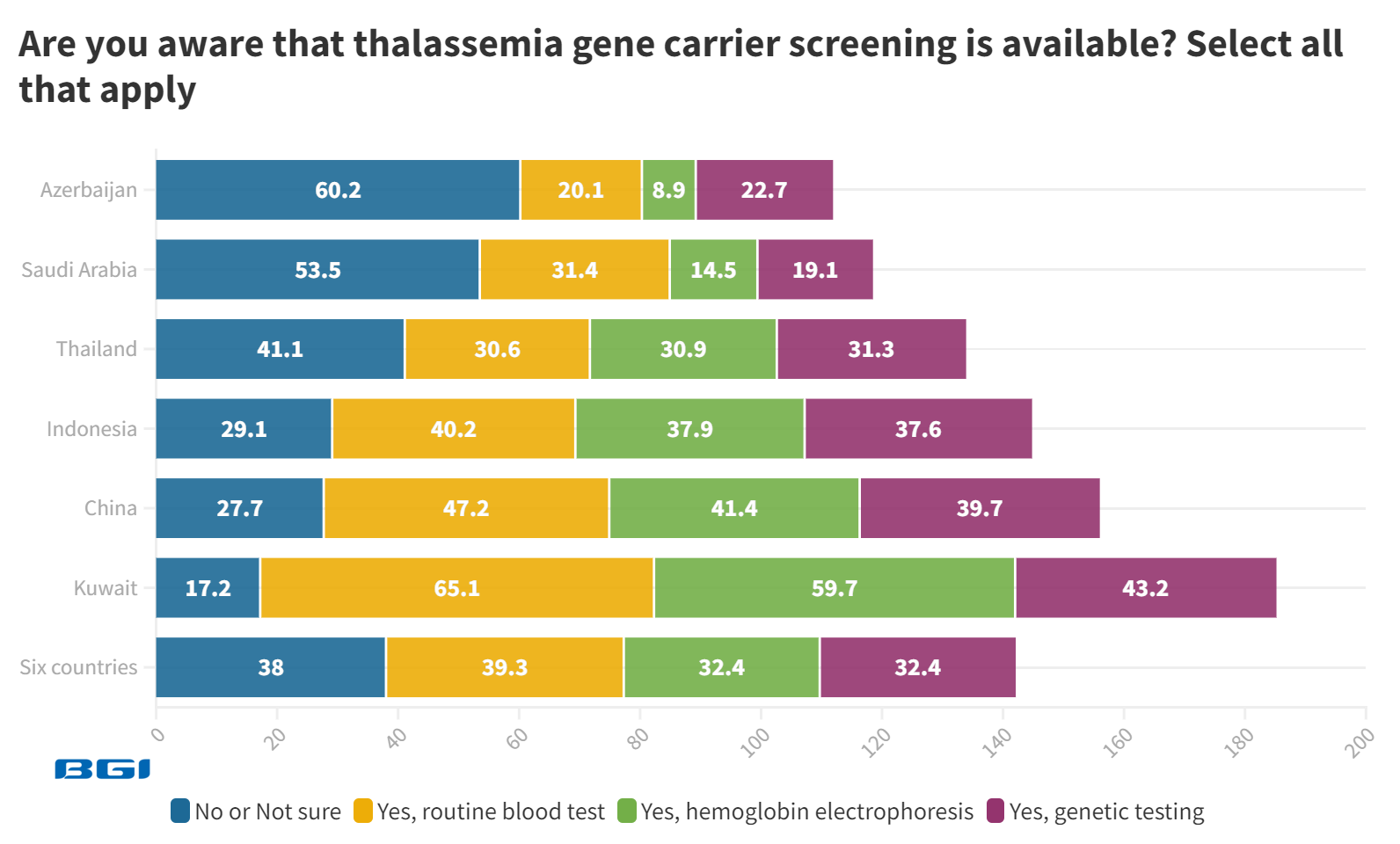
44.6% worldwide are aware that hereditary genetic mutations cause thalassemia. Thailand (67.8%) has the highest level of awareness about hereditary genetic mutations, while Indonesia (21.2%) has the lowest level of understanding.
Websites (45.1%) and health awareness programs (43.2%) are the top channels cited by women in terms of how they obtain thalassemia-related information. China (58.3%) and Kuwait (56.4%) have the highest percentage citing health awareness programs as a source of information.
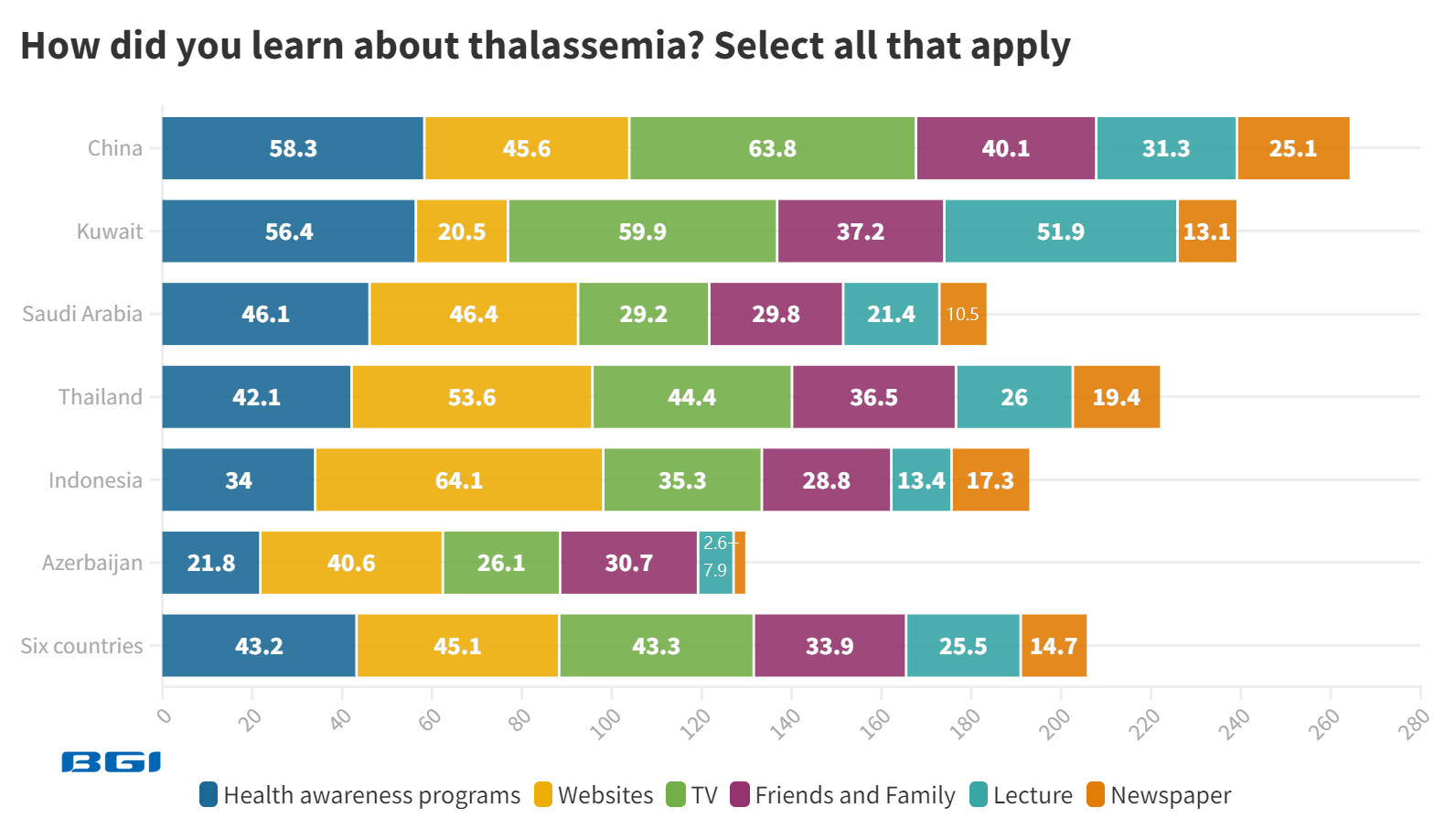
What's holding women back from thalassemia carrier screening?
86.0% worldwide have not taken a thalassemia screening test. Azerbaijan (96.4%) and Indonesia (95.4%) have the highest percentage who haven't taken this test, while Kuwait (61.5%) has the lowest rate.
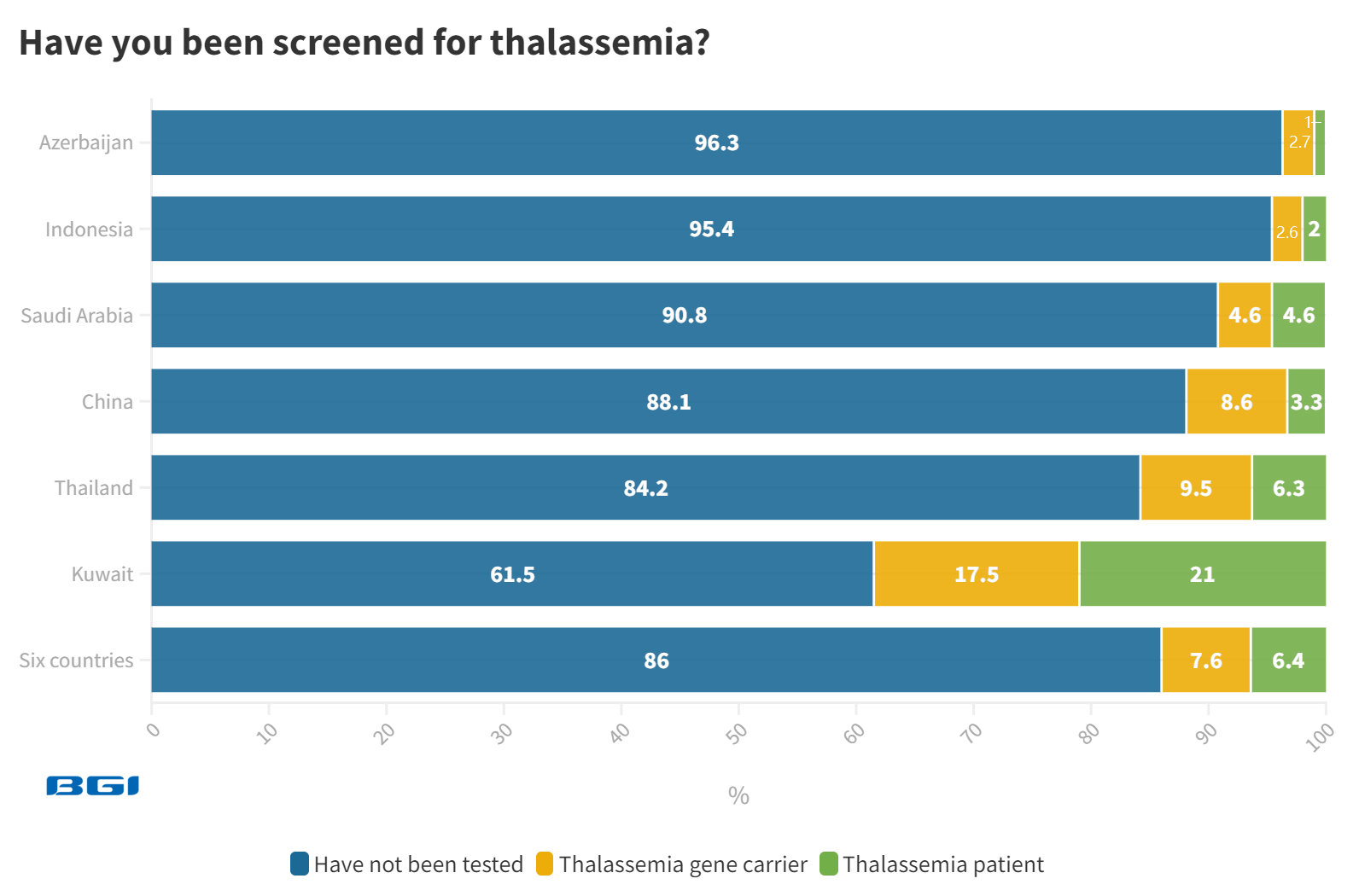
Accessibility to thalassemia tests matter. Hospitals or agencies nearby that provide screening services (43.1%), cost of screening services (38.1%), and before getting married or having children (35.3%) are the top reasons that affect willingness to undergo thalassemia screening. Hospitals or agencies nearby are top in China (60.7%) and Kuwait (54.2%), while before getting married or having children is highest in Azerbaijan (44.0%) and China (39.6%).
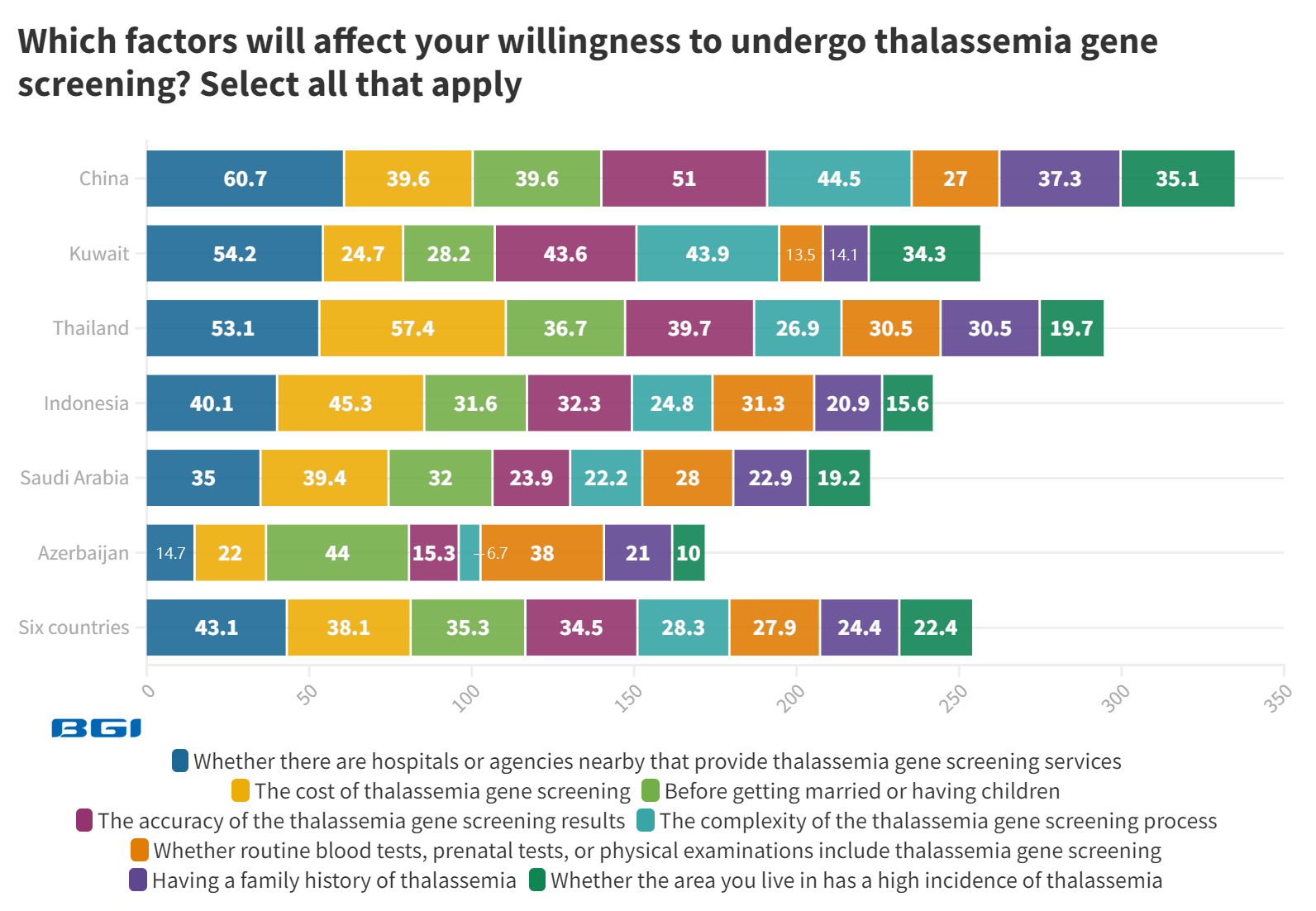
Changing attitudes with awareness
The experience and knowledge, particularly in the Southern Mediterranean countries over the last two decades, have led to the publication, initially by the WHO and later by the Thalassemia International Federation (TIF), of guidelines for the management and control of thalassemia. With more awareness, individuals can make more informed decisions regarding thalassemia screening (premarital, pre-pregnancy and prenatal tests), genetic counseling and preimplantation genetic diagnosis (PGD).
How does awareness shape attitudes towards screening?
After learning about the health risks and high lifetime treatment costs associated with thalassemia, 84.5% of women are more willing to undergo some form of thalassemia screening (premarital, pre-pregnancy and prenatal tests). Kuwait (94.1%) and Thailand (91.2%) have the highest percentage who are more willing to undergo some form of thalassemia screening.
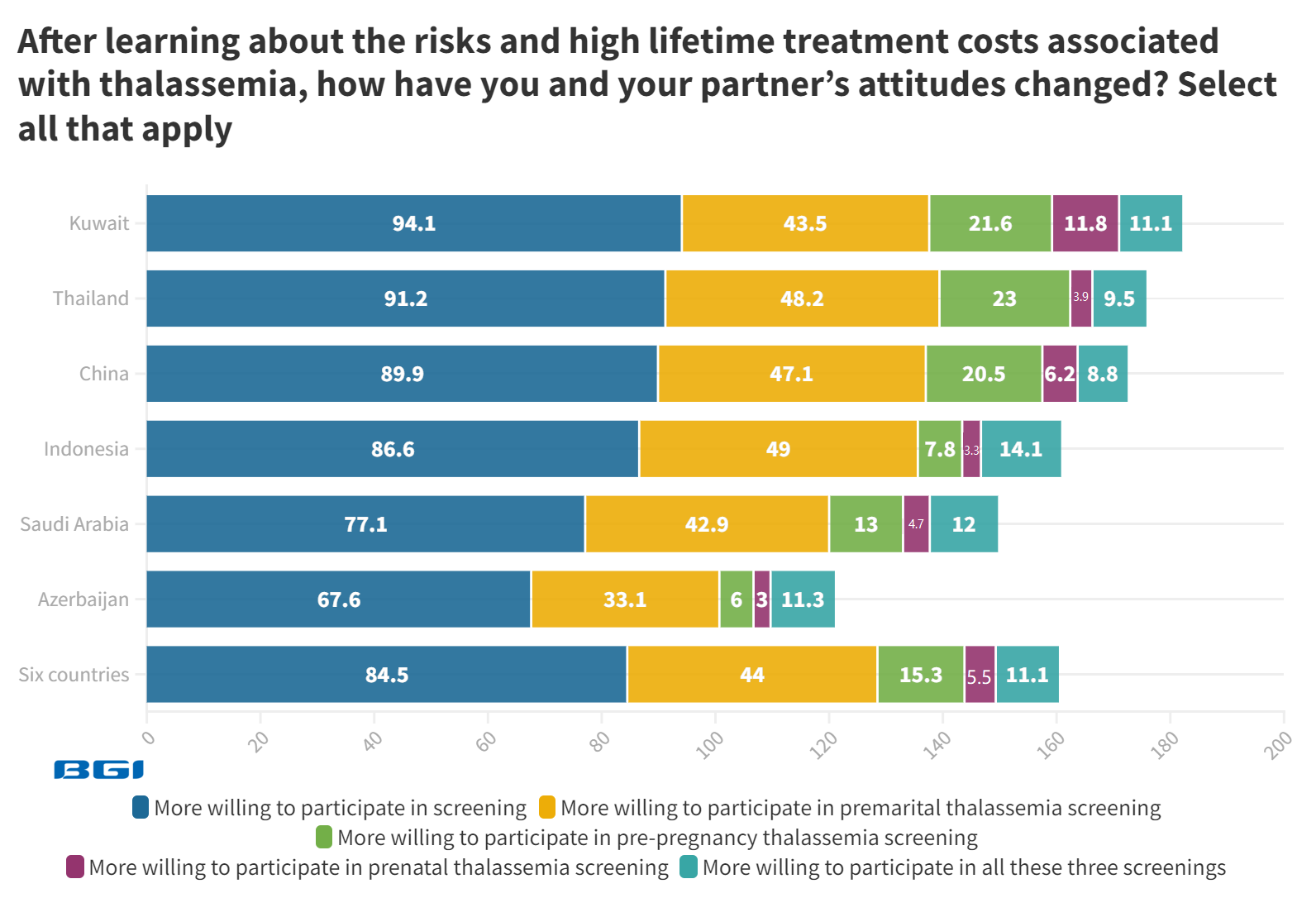
With enhanced awareness, the premarital thalassemia screening test is the most popular option (44.0%), with Indonesia (49.0%) and Thailand (48.2%) leading in this regard. Pre-pregnancy and prenatal thalassemia tests are chosen by 15.3% and 5.5%, respectively. Kuwait (11.8%) and China (6.2%) have the highest percentage who choose prenatal thalassemia tests.
Are thalassemia carriers more willing to go for genetic counseling?
If two people carrying the same form of thalassemia trait have a child, there is a one in four (25%) chance that this child will be born with a severe form of thalassemia. Preimplantation genetic diagnosis (PGD) is an established procedure to allow couples to test for specific genetic conditions, such as thalassemia in the early embryo, before the selection of embryos for transfer to the uterus to establish pregnancy.
If both partners are thalassemia carriers, 50.9% of women can persuade their partners to go for genetic counseling and consider PGD. If women have obtained information about thalassemia from health awareness programs, this percentage rises to 59.5%. Thus, health awareness programs may play a key role in genetic counseling and PGD promotion.
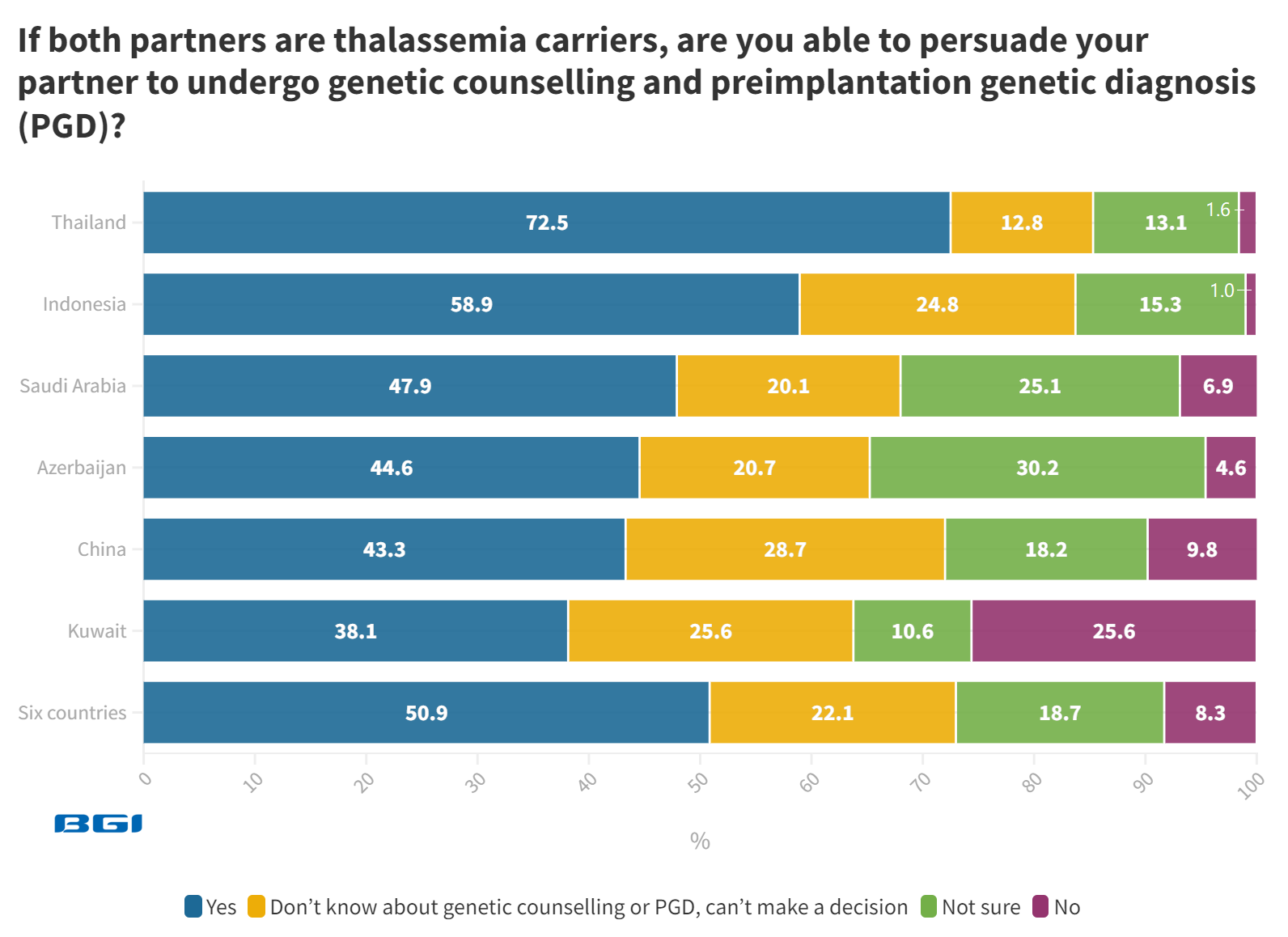
Thailand (72.5%) and Indonesia (58.9%) have the highest percentage of women who indicate that genetic counseling and PGD are options that they will consider. These options raise the likelihood of giving birth to a child free from thalassemia.
However, 22.1% of women do not know about genetic counseling or PGD and can't evaluate these options. China (28.7%) and Kuwait (25.6%) have the highest percentage unaware of these options.
About BGI Genomics and thalassemia screening tests
BGI Genomics, headquartered in Shenzhen, China, is the world's leading integrated solutions provider of precision medicine. In July 2017, as a subsidiary of BGI Group, BGI Genomics (300676.SZ) was officially listed on the Shenzhen Stock Exchange.
The company has pioneered thalassemia genetic testing services based on next-generation sequencing (NGS) technology since 2013. Expanding the availability of genetic testing has been instrumental in the screening, diagnosing, and treating thalassemia.
Methodology
1,847 female respondents from Azerbaijan (306), China (308), Indonesia (307), Kuwait (315), Saudi Arabia (306), and Thailand (305) participated in this survey in October 2023.
When this survey was conducted, these respondents were based in their respective country or region. Momentive Global conducted surveys in local languages. Respondents were aged between 21 to 49 years old.
Indonesian press release: Antara, Thai press release: RYT9, Arabic press release: Al-Anbaa
Read More:
2023 Global State of Cervical Cancer Awareness Report
2023 Global State of Colorectal Cancer Awareness Report